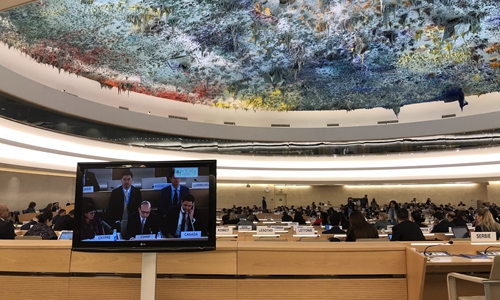HOME >> CHINA
China welcomes the UN High Commissioner for Human Rights to visit Xinjiang: envoy
By Liu Xin in Geneva Source:Globaltimes.cn Published: 2020/2/27 7:53:44

Ambassador Chen Xu, permanent representative of China to the United Nations office in Geneva and other international organizations in Switzerland, speaks during the 43rd session of the UN Human Rights Council. Photo: Liu Xin/GT
Chinese representatives to the 43rd session of the United Nations Human Rights Council reiterated China's stance on its Northwest Xinjiang Uygur Autonomous Region policies, telling some western countries that there is no one-size-fits-all model for human rights protection and China welcomes the UN High Commissioner for Human Rights to visit Xinjiang.
Based on bias toward China, some countries made groundless accusations about China's policies in Xinjiang during the high level segment of the 43rd session of the Human Rights Council on Wednesday, which China firmly opposed and will not accept, said Ambassador Chen Xu, permanent representative of China to the United Nations office in Geneva and other international organizations in Switzerland.
"China has taken a series of counterterrorism and de-radicalization measures, including establishing vocational education and training centers in Xinjiang. These measures have greatly improved the security situation in Xinjiang, protected human rights of people from all ethnic groups and contributed in a significant way to international counterterrorism and de-radicalization efforts," Ambassador Chen said.
"China stays ready to invite more people to Xinjiang to see for themselves the economic, social and human rights development there.
"China welcomes Madam Michelle Bachelet, the United Nations High Commissioner for Human Rights, to visit China, including Xinjiang, this year and we are in close contact with her office in this regard," Chen noted.
Chen said that the Chinese government has received more than 1,000 diplomats, international organization officials, journalists and religious leaders in Xinjiang. They all have concluded that what they have seen in Xinjiang is quite the opposite to what is represented in Western media.
The United Kingdom and a few other countries groundlessly accused China of "detaining" Uygur people and interfering with people's religious practices in Xinjiang during Wednesday's council session.
Special representative for Human Rights of the Ministry of Foreign Affairs of China, Liu Hua said their moves "interfered in China's internal affairs and judicial sovereignty, which China firmly opposes."
Liu said that in Xinjiang's training centers, trainees' personal freedom, ethnic customs, freedom of religious beliefs and the right to receive medical treatment were fully protected, and the trainees could go home on weekends.
At present, all the trainees participating in education and training programs have graduated and got stable jobs with the help of the government, Liu said.
Liu said that some countries and forces have criticized China over its policies in Xinjiang. "Some of them are unaware of the truth, and some are simply unwilling to acknowledge the truth. Instead, they use human rights as a policy tool to discredit, slander and suppress China.
"When China took counter-terrorism and de-radicalization measures in accordance with the law, these countries and forces would say that the counter-terrorism measures were excessive. The measures, they claimed, are in violation of human rights while the same practices in their own countries are considered the rule of law. When China invited these countries to visit Xinjiang, they refused for various reasons," Liu said.
When more than 70 countries explicitly supported China's policy in Xinjiang through joint letters and statements, and pointed out that measures taken in Xinjiang are positive practices of counter-terrorism and deradicalization, and effectively protect the basic human rights of people of all ethnic groups, they said that those countries gave in to pressure from China, and that hearsay is far from the truth.
Liu said that China's practices show that there is not a one-size-fits-all model for human rights protection, and modernization is not Westernization. The protection of human rights must adhere to a development path that suits a country's own conditions.
"There is no war, no displacement and no fear on China's land of over 9.6 million square kilometers, and nearly 1.4 billion people live a peaceful, free and happy life - this is the largest human rights project and this is the best human rights practice," Liu said.
Posted in: DIPLOMACY,CHINA FOCUS